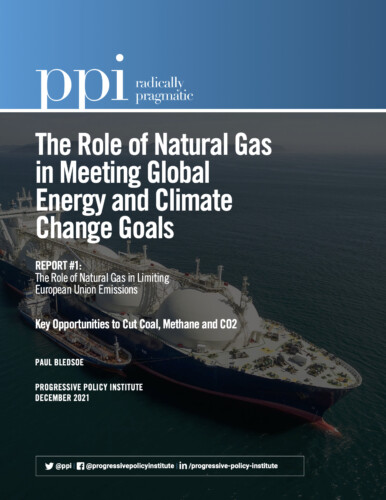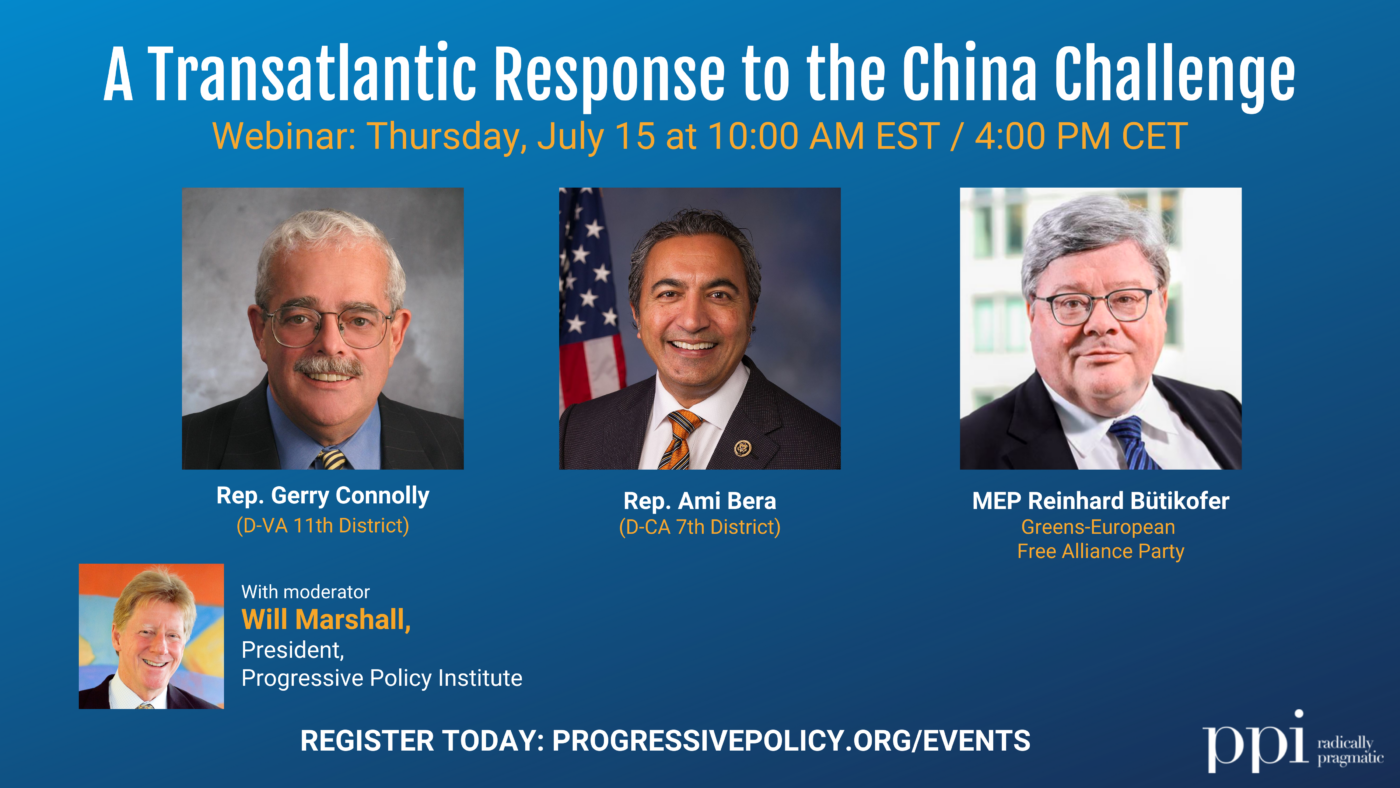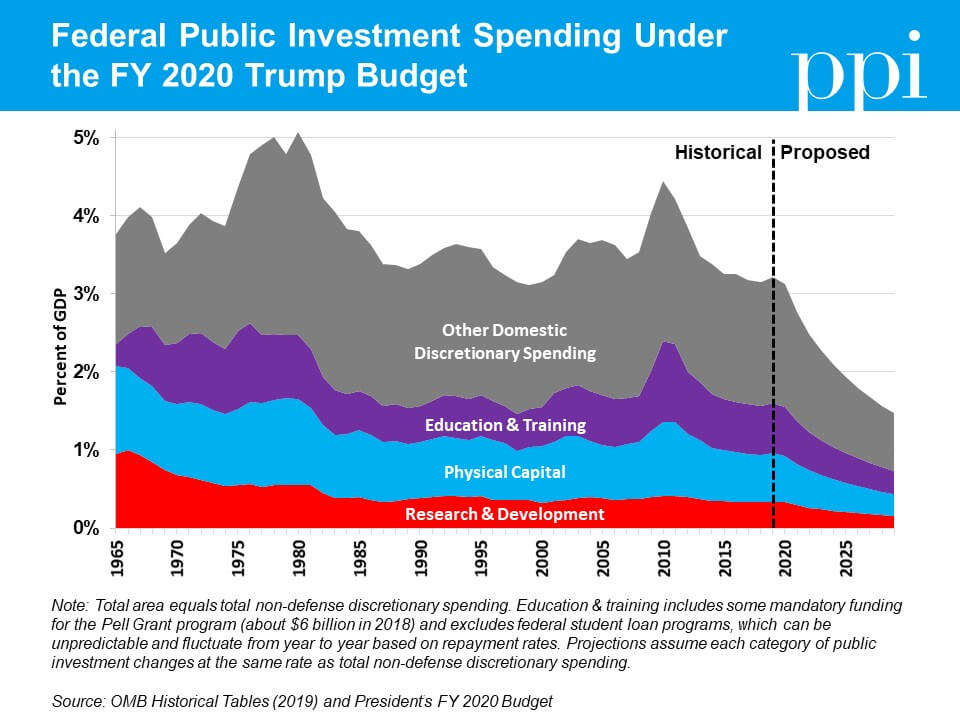EXECUTIVE SUMMARY
The European Union in recent actions and the United States under President Joe Biden have both offered bold visions for deeply reducing greenhouse gas emissions and asserting leadership in the global fight against climate change. Each is taking important steps to reduce harmful emissions from natural gas, including more aggressive methane controls, emissions reporting, and investments in carbon capture and storage technology.
These initiatives hold great promise in helping Europe lessen its dependence on coal and other dirtier fuel types, as well as ensure that gas imported into the EU is as clean as possible to help Europe meet its climate goals.
For example, on July 14, 2021, the European Union announced sweeping new climate change goals in its “Fit for 55” directive. The extraordinarily ambitious program requires the EU to reduce its greenhouse emissions by 55% below 1990 levels by 2030, relying on the EU carbon trading and pricing market, new Green Deal programs, a wide range of clean energy subsidies, and the beginning of some fossil fuel use restrictions. Most climate experts see the EU proposal as the first-ever attempt by one of the world’s three major centers of economic growth and innovation to reduce emissions in keeping with the key Paris agreement goal of reaching net zero emissions globally by 2050 and keeping temperatures from rising more than 1.5 Celsius.
However, today, the EU still gets at least 15% of its electricity from coal, with far higher percentages in Germany, Poland, and other eastern European countries. Analysis by the International Energy Agency and other leading experts predicts that the EU will use a mix of renewable energy and natural gas to displace coal. Indeed, most studies find that gas use in the EU will grow over the next decade to balance increased intermittent renewable energy on the EU electrical grid as other forms of baseload power (coal and much nuclear power) are phased out.
Yet even as the European Union undertakes these unprecedented steps to reduce emissions, it is increasing its reliance on natural gas from Russia’s notoriously leaking, antiquated, and nontransparent gas production and transport system, which has extremely high fugitive emissions of methane, a super-potent greenhouse gas. The EU imports about 40% of its total natural gas from Russia — despite data showing that Russian gas is worse from a climate change perspective than the very coal natural gas is meant to displace. Indeed, new data from the International Energy Agency (IEA) shows that Russia is the world’s largest methane emitter, with massive new “super-emitting” methane plumes detected this year, even as studies how Russia has consistently lied about and covered up its emissions for decades.
The EU’s importation of high methane emitting Russian gas is a profound flaw in the EU’s climate plans which may prevent it from truly reaching its 2030 emissions goals. While huge methane emissions from Russian gas imports may not be technically counted under the EU’s greenhouse gas accountancy system, they are nonetheless causing massive greenhouse gas emissions of methane (84 times more potent than CO2) at precisely the time leading experts say cutting methane emissions is the key to keeping temperatures below the Paris targets of 1.5°C and 2°C.
Indeed, in mid-September 2021, the EU recognized the urgent need to cut emissions of methane in an agreement with the United States, the United Kingdom, and other nations to reduce overall methane emissions from all sources within their borders by 30% before 2030. Such admirable efforts to reduce methane, however, will be swamped and rendered ineffectual by global methane emissions from Russian gas and other sources of the EU’s gas imports which are outside of this agreement.
In recent months, in fact reducing methane emissions has become a centerpiece of climate protection, as evidenced by the EU, U.S. and over 100 other nations signing a pledge at the recent UN climate negotiations in Glasgow, Scotland, to cut methane by 30% by 2030. However, Russia, Iran, Qatar and other major gas exporters and methane emitters have not signed the pledge.
This report finds that the EU has an array of new options to reduce near-term dependence on Russian gas. These include greater renewable energy use, electricity storage technologies, and imports of lower-emitting U.S. liquefied natural gas. Current high natural gas prices are roiling European markets and consumers, spotlighting the increasing need for larger liquefied natural gas shipments from the US and other sources, both this winter and for years to come. In fact, specific methane reducing actions by the EU and U.S. can play the key role in forcing all global gas imports to lower their emissions dramatically by creating demand competition for low-emitting gas.
The most important imperative is for the lifecycle of methane emissions from natural gas production to be driven down as close to zero as possible by both major exporters and importers. In the United States, President Joe Biden and Congress are acting to both impose stringent regulations on methane emissions and take new steps to sharply reduce fugitive emissions and the venting of gas from existing and old unused wells. Such efforts are crucial to limiting near- term temperatures globally as a series of studies have concluded, especially the August 2021 urgent report by the United Nations International Panel on Climate Change.
Moreover, as the IEA noted in its “methane tracker” report released in January 2021, it is in the “strong interest” of natural gas companies to cut methane emissions, since, over time, users will demand, and nations will require, the lower- emitting methane gas sources. “Aside from the environmental gains, oil and gas operations with lower emissions intensities are increasingly likely to enjoy a commercial advantage,” the report said.
Nonetheless, government action to limit methane globally is critical. This should include requirements by the EU, the world’s largest natural gas importer, that methane emissions from both domestic and imported gas be accurately verified and monitored, and then regulated to as close to zero as possible. Such a “global race to near-zero fugitive methane emissions” among natural gas competitors would dramatically cut global emissions, even as gas displaces remaining coal in Europe, Asia, and elsewhere. In this way, super-low-methane gas exports (and also low-CO2 gas with carbon capture and storage) can play a major role in reducing greenhouse gas global emissions even as renewable energy grows.
The IEA and other top analysts believe that the EU will have to use natural gas to displace remaining coal use and balance the EU grid, with gas over the next two decades providing baseload electric power as intermittent renewable energy becomes a higher percentage of the EU’s power supply and as the demand for electricity increases due to electrification of transportation and broader growth. Methane from oil and gas is Europe’s third largest source of greenhouse gas emissions. Thus, reducing methane emissions from all EU natural gas sources, including imports, is essential to meet the European goal of cutting emissions 55% compared to 1990 levels by 2030.
The EU imports more than 60% of its gas, and total methane emissions from gas-exporting countries like Russia are at least three and eight times the emissions from the domestic EU gas supply chain. If these “imported methane emissions” are calculated by the European Union as it determines its overall emissions profile, they will swamp progress made on other fronts and prevent true reduction of its total emissions. The EU also imports more than 40% of its total natural gas from Russia. Yet data consistently shows that Russian gas is even worse than coal in contributing to greenhouse gas emissions. Russia has deliberately prevented attempts to fully assess its high methane emissions for decades, choosing instead to point the finger at other gas producers and use the echo chamber of its influence operations in Europe to attempt to discredit attempts to hold Moscow to account.
The EU Commission has committed to reducing methane emissions in its domestic energy sector and engaging in a dialogue with its international partners about what carrots and sticks could be used to lower the methane profile of imported gas. But it has not yet promulgated standards to accomplish these goals.
Fortunately, new and more accurate methane detection technologies are increasingly being deployed. They should become standard in the world’s major natural gas producing nations. Nations that refuse to have their gas monitored and verified should be denied import status by the EU and other major importers over time.
New sources of gas, including liquefied natural gas (LNG) imports from the United States and other clean sources, can reduce the EU’s reliance on methane-heavy Russian gas. But of course, that will require the United States and other exporters to drive down methane and carbon dioxide emissions from the lifecycle as close to zero as possible, and verify their reductions with credible methodologies.
Moreover, the geopolitical costs of Russian gas continue to plague the EU broadly, and Ukraine and other Eastern European nations specifically. EU imports of Russian gas have actually increased since Moscow’s illegal annexation of the Crimea in 2015. Over time, limiting Russian gas imports thus could diminish its political leverage over Europe while also helping the EU achieve its climate goals.
Given these realities, European support for the Nord Stream 2 pipeline from Russia to Germany is a massive strategic mistake. Making the pipeline operational would clearly increase Russia’s leverage over Ukraine and other Eastern European countries. In addition, allowing Russia to operationalize the pipeline will dramatically reduce the EU’s leverage to compel the state- owned Russian monopoly Gazprom to reduce its methane emissions.
The United States has long had better methane and carbon dioxide reporting standards and measurements than other gas exporters, leading the world in both methane science and efforts to reduce methane emissions. More importantly, the Biden Administration, Congress, and the U.S. natural gas industry are beginning to undertake a series of strategic steps to make U.S. gas super- low emitting compared to gas from Russia and other major exporters. This would give U.S. gas a competitive advantage in world markets, boost U.S. LNG sales abroad, and enable European gas importers to make deeper cuts in greenhouse gas emissions as they transition away from burning coal.
Summary of Key Recommendations:
• The EU should put in place rigorous monitoring, reporting and verification rules covering all natural gas, both domestically produced and imported.
• Over the next few years, the EU should require gas exporters to accurately verify
lifecycle emissions of methane as a condition for gaining access to the EU market.
• The EU and United States should harmonize their monitoring, reporting, and verification(MRV) regimes of lifecycle emissions from natural gas as a key interim step in this process. This step is crucial in setting a global benchmark for MRV emissions from gas, given the much greater transparency and accuracy of emissions measurements from natural gas produced in the EU and U.S.compared to other gas exporters to the EU.
• The EU should consider adopting stringent methane emissions regulations for domestically produced natural gas immediately, and then extend these requirements to imported gas at the earliest opportunity.
• The EU should seek to diversify and expand its natural gas importation sources both to reduce gas prices to phase out coal and to pressure importers of all types to begin to cut its lifecycle methane and carbon emissions.
• The United States should accelerate its already significant measures to drive down U.S. methane emissions from natural gas production and transportation. In the near-term, the U.S. should aim at making its gas super-low emitting, with fugitive emissions of less than 0.5% of total volume, by far the lowest emitting in the world. In time, U.S. gas should be even lower-emitting, with close to zero methane emissions, and dramatically increase the deployment of carbon capture and storage technologies for CO2 emissions from gas.
• The EU should measure precisely the extent to which Russian gas with high fugitive methane emissions is undermining progress toward both EU and global climate change goals. Specifically, Brussels should study potential emissions from gas transported through the Nord Stream 2 pipeline before allowing the pipeline to become operational.
• Over time, the EU should require all natural gas used in the EU achieve super-low methane and CO2 emissions, as gas will be needed to displace coal in the EU to meet climate goals. Such EU actions during the current decade can help not only meet its own greenhouse gas emissions goals for 2030, but begin the process of bringing natural gas emissions to the lowest possible levels around the world and using it to displace global coal use.
• Increasing low-emitting U.S. liquefied natural gas imports to the EU can play a key role in. this process, and should be a domestic and
international climate change policy priority for both the EU and U.S.
• The EU should prioritize LNG port construction, access, and related infrastructure to spur a competition toward super-low emitting gas, and to displace Russian gas.
• The EU can advance its own energy and security interests, as well as its climate goals, by acting on its stated policy of reducing its
dependence on Russia gas, cutting imports by at least half during the current decade.
Download and read the full report:






 Biden and Boris
Biden and Boris